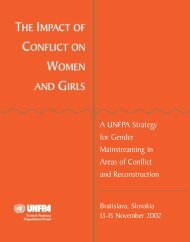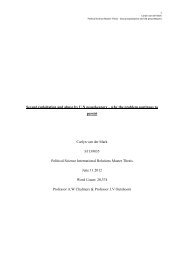Stop Sudah English-revised-March2012 - International Center for ...
Stop Sudah English-revised-March2012 - International Center for ...
Stop Sudah English-revised-March2012 - International Center for ...
You also want an ePaper? Increase the reach of your titles
YUMPU automatically turns print PDFs into web optimized ePapers that Google loves.
o a special provincial law to address HIV/AIDS among women, children and youth.<br />
• based on inputs of the Papuan People’s Assembly, immediately <strong>for</strong>mulate and establish special<br />
provincial regulations <strong>for</strong> the protection of the rights of women victims.<br />
Religious institutions shall:<br />
• incorporate the issues and problems of violence against women and violations of women’s human<br />
rights in church/religious education curriculum, sermons, chatecism materials, and other guidance<br />
materials.<br />
• expand the church’s routine and pastoral ministry (sacraments, baptism, confirmation, marriage,<br />
pastoral counseling, etc.) <strong>for</strong> social-spiritual recovery of women victims of state violence as well as<br />
children born of sexual violence.<br />
• increase capacity to provide pastoral care <strong>for</strong> victims of domestic violence and their families.<br />
• play a role in removing various stigmas, discrimination, and ostracism by society towards women<br />
victims and people living with HIV/AIDS.<br />
• acknowledge and strengthen the presence and involvement of women in decision-making systems of<br />
the respective religious institutions.<br />
• proactively cooperate with various parties, including NGOs and the government, in ef<strong>for</strong>ts/programs<br />
to address violence against women and the fulfillment of human rights of women victims of violence.<br />
The Tribal Council and Papuan Tribal Leaders shall:<br />
• give priority to the values of indigenous peoples over financial/corporate interests and ensure that<br />
traditional leaders function as protectors and guardians of indigenous customs.<br />
• involve women in decision-making processes of traditional institutions <strong>for</strong> the realization of justice<br />
and peace <strong>for</strong> all.<br />
• overcome stigma, discrimination, and ostracism that communities often legitimate with indigenous<br />
values and traditions, and provide protection <strong>for</strong> women and children victims of violence.<br />
• reestablish and rebuild traditional houses as centers of education of indigenous values based on respect<br />
<strong>for</strong> women’s rights, human rights, the environment, and gender equality.<br />
• establish an indigenous judiciary and impose customary sanctions on perpetrators of violence against<br />
women, and proactively prevent and handle cases of violence against women.<br />
Civil Society Organizations shall:<br />
• actively participate in the process of policy <strong>for</strong>mulation and programs <strong>for</strong> the protection of Papuan<br />
women’s rights and oversee their implementation.<br />
• participate in preventing and settling cases of violence against women and conduct ongoing<br />
monitoring of violence against women.<br />
• encourage change in society’s discriminatory behavior towards women victims of violence, people<br />
living with HIV/AIDS, and other vulnerable groups.<br />
• develop special programs <strong>for</strong> the recovery and empowerment of women victims of violence.<br />
Provincial/District/City Women’s Empowerment Bureaus shall:<br />
• support and work with women’s groups to build and optimize safe houses <strong>for</strong> women and children<br />
victims of violence.<br />
• collaborate with stakeholders (police, religious and traiditional institutions, NGOs) to care <strong>for</strong> victims.<br />
• establish work programs and ensure budget allocations <strong>for</strong> the care of victims of violence and support<br />
civil society organizations that empower women and care <strong>for</strong> victims of violence.<br />
Mass Media shall:<br />
• provide educative and impartial reporting on women victims of violence and victims of human rights<br />
violations.<br />
ENOUGH IS ENOUGH! 56




![IANSA [PDF, 2MB] - PeaceWomen](https://img.yumpu.com/25206379/1/190x123/iansa-pdf-2mb-peacewomen.jpg?quality=85)
![Commitments Sample [PDF, 93KB] - PeaceWomen](https://img.yumpu.com/25206331/1/190x245/commitments-sample-pdf-93kb-peacewomen.jpg?quality=85)










![A Toolkit for Advocacy and Action [PDF, 260KB] - Peace Women](https://img.yumpu.com/25205989/1/190x245/a-toolkit-for-advocacy-and-action-pdf-260kb-peace-women.jpg?quality=85)